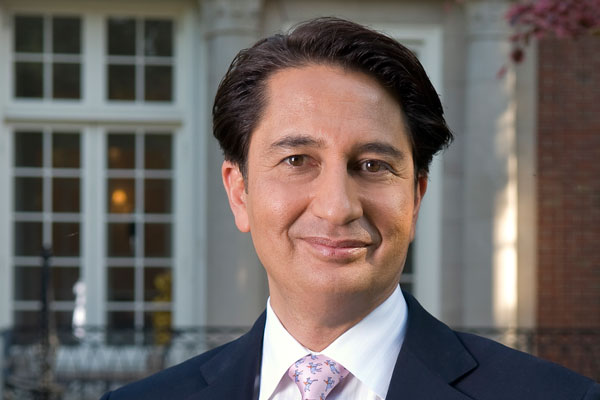Afghan Ambassador Names Pakistan in Kabul Bombing « The Washington Independent
Jul 31, 2020242.8K Shares3.4M Views
Ambassador Said Jawad (Embassy of Afghanistan)
Afghanistan’s ambassador to Washington directly blamed Pakistan’s Inter-Services Intelligence service for last month’s bombing of the Indian embassy in Kabul, reiterating a charge made recently by President Hamid Karzai and strenuously denied by the Pakistanis. During an extended interview Wednesday, Amb. Said Jawad also said that while his country does require additional foreign troops in the short-term, the priority in the post-Bush era of U.S.-Afghan relations was to train Afghan security forces.
Asked what he made of the U.S. intelligence community’s assessmentthat the Pakistani Inter-Services Intelligence agency, known as the ISI, engineered a massive July 7 bombing at the Indian Embassy in Kabul that left 54 people dead, Jawad, sitting in Afghanistan’s embassy in the stately Kalorama neighborhood of Washington, said, “They are not accusing Pakistan, they are stating a fact,” he said. “There is evidence not only by our intelligence service, but also by our partners who are operating in Afghanistan. There is clear evidence of ISI involvement in the bombing of the embassy.”
Image has not been found. URL: http://www.washingtonindependent.com/wp-content/uploads/2008/09/nationalsecurity1.jpgIllustration by: Matt Mahurin
The bombing, Jawad said, indicates, “ISI is an intelligence agency with limited wisdom. It is wrong to work with an extremist group. It is completely wrong to work with a suicide bomber that would go into the Indian embassy and consider India a bigger enemy than terrorism and extremism. The real threat to stability, to peace, to prosperity of Pakistan, of Afghanistan and the region is extremism. This will have implications, of course, of rising tensions between India and Pakistan, and that’s something we would like to avoid. We really need to work together in the region to overcome the threat of extremism and terrorism.”
On Tuesday, President Hamid Karzai, making his bluntest statement so far on the bombing, toldIndia’s NDTV network, “We and our allies have evidence from the scene and beyond that, unfortunately, indicates a hand like that is responsible. We are fairly confident.” On Wednesday, the Pakistani Senate denouncedKarzai’s remarks.
Representatives of the Pakistani embassy in Washington did not return multiple calls seeking comment. But placing culpability for the bombing with the ISI “seems to be a rather broadly shared point of view,” said Barnett Rubin, an Afghanistan expert at New York University. “It’s the same thing that the CIA told The New York Times. It’s not something that would be considered very surprising in the region.”
Jawad, a slender Kandahar native with a Kennedyesque shock of floppy black hair, who served as Karzai’s chief of staff before becoming ambassador in 2003, also discussed the U.S. debate over troop levels in Afghanistan. “It is important that our foreign partners help us build the capacity of the Afghan security forces,” he said, “This is the most sustainable, the most economical way of defending Afghanistan, the region and, hopefully, the world against the threat of international terrorism.”
However, the ambassador said, the number of U.S. and NATO now troops in Afghanistan is insufficient to control deteriorating security conditions. “Certainly, the current level of the security forces — combined Afghan, U.S., NATO and international — is not adequate to overcome the current security challenges we are facing in Afghanistan,” Jawad said. “The short-term security solution is to increase the number and the capacity and the quality of the international troops.”
Three weeks ago, Pentagon officials lengthened combat tours for some Marine units in Afghanistan, raising the U.S. troop presence there to a highwater-mark of 36,000. The American troops make up about half the approximately 70,000 NATO forces assigned to secure a country of roughly 31 million people. By contrast, there are about 140,000 U.S. troops in Iraq, a nation of approximately 26 million people. U.S. commanders have requested an additional force of approximately 10,000 troops, but the request is unlikely to be met this year — though attacks in eastern Afghanistan, on the volatile and porous border with Pakistan, are already up 40 percent over 2007.
Last week, a retired four-star Army general, Barry McCaffrey, summarizeda recent trip to Afghanistan by saying the country is “in misery” and that 2009 would be “the year of decision,” as the Taliban stepped up attacks on U.S., NATO and Afghan forces. Jawad largely rejected McCaffrey’s characterization.
“We appreciate when our friends are giving us frank assessments,” Jawad said. “On the other hand, we should not dramatize these issues. We have heard in the past about the Taliban’s spring offensives that will wipe out everything, or they will be [overrunning] some major cities — issues of that nature.”
But Jawad conceded that McCaffrey did raise a salient point by highlighting the disjointed nature of U.S.-NATO-Afghan disunity in planning the war and reconstruction efforts. “We are facing the issue of coordination between these different countries, different institutions, who are coming in with different degrees of commitment, different types of commitment, constrained by their own constitutions [or] still facing the issue of national caveats,” he said, referring to the restrictions that certain NATO member-states have placed on the types of combat activities their militaries may legally engage in.
Jawad also said that the U.S. had “two very capable candidates” for president in Sens. Barack Obama (D-Ill.) and John McCain (R-Ariz.), both of whom have pledged to ramp up the U.S. troop presence in Afghanistan. “The next administration will be a lot more committed to assist Afghanistan,” he said, “and will be facing the tremendously serious challenge of what to do in Pakistan. And these two questions, these two issues, are connected. There will be no peace and stability in Afghanistan unless Pakistan really properly and sincerely works with us and the international community.”
Rubin of New York University, described Jawad as a friend. “I think he’s doing a great job,” he said. “He’s an extremely thoughtful interlocutor and friend. He’s honest.” Rubin added, with a laugh, “well, honest with me, anyway.”

Rhyley Carney
Reviewer
Latest Articles
Popular Articles
